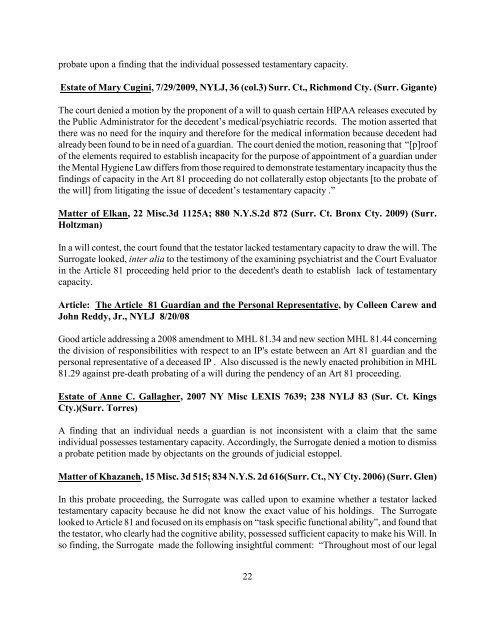MHL ARTICLE 81 - New York State Unified Court System
MHL ARTICLE 81 - New York State Unified Court System
MHL ARTICLE 81 - New York State Unified Court System
You also want an ePaper? Increase the reach of your titles
YUMPU automatically turns print PDFs into web optimized ePapers that Google loves.
probate upon a finding that the individual possessed testamentary capacity.<br />
Estate of Mary Cugini, 7/29/2009, NYLJ, 36 (col.3) Surr. Ct., Richmond Cty. (Surr. Gigante)<br />
The court denied a motion by the proponent of a will to quash certain HIPAA releases executed by<br />
the Public Administrator for the decedent’s medical/psychiatric records. The motion asserted that<br />
there was no need for the inquiry and therefore for the medical information because decedent had<br />
already been found to be in need of a guardian. The court denied the motion, reasoning that “[p]roof<br />
of the elements required to establish incapacity for the purpose of appointment of a guardian under<br />
the Mental Hygiene Law differs from those required to demonstrate testamentary incapacity thus the<br />
findings of capacity in the Art <strong>81</strong> proceeding do not collaterally estop objectants [to the probate of<br />
the will] from litigating the issue of decedent’s testamentary capacity .”<br />
Matter of Elkan, 22 Misc.3d 1125A; 880 N.Y.S.2d 872 (Surr. Ct. Bronx Cty. 2009) (Surr.<br />
Holtzman)<br />
In a will contest, the court found that the testator lacked testamentary capacity to draw the will. The<br />
Surrogate looked, inter alia to the testimony of the examining psychiatrist and the <strong>Court</strong> Evaluator<br />
in the Article <strong>81</strong> proceeding held prior to the decedent's death to establish lack of testamentary<br />
capacity.<br />
Article: The Article <strong>81</strong> Guardian and the Personal Representative, by Colleen Carew and<br />
John Reddy, Jr., NYLJ 8/20/08<br />
Good article addressing a 2008 amendment to <strong>MHL</strong> <strong>81</strong>.34 and new section <strong>MHL</strong> <strong>81</strong>.44 concerning<br />
the division of responsibilities with respect to an IP's estate between an Art <strong>81</strong> guardian and the<br />
personal representative of a deceased IP . Also discussed is the newly enacted prohibition in <strong>MHL</strong><br />
<strong>81</strong>.29 against pre-death probating of a will during the pendency of an Art <strong>81</strong> proceeding.<br />
Estate of Anne C. Gallagher, 2007 NY Misc LEXIS 7639; 238 NYLJ 83 (Sur. Ct. Kings<br />
Cty.)(Surr. Torres)<br />
A finding that an individual needs a guardian is not inconsistent with a claim that the same<br />
individual possesses testamentary capacity. Accordingly, the Surrogate denied a motion to dismiss<br />
a probate petition made by objectants on the grounds of judicial estoppel.<br />
Matter of Khazaneh, 15 Misc. 3d 515; 834 N.Y.S. 2d 616(Surr. Ct., NY Cty. 2006) (Surr. Glen)<br />
In this probate proceeding, the Surrogate was called upon to examine whether a testator lacked<br />
testamentary capacity because he did not know the exact value of his holdings. The Surrogate<br />
looked to Article <strong>81</strong> and focused on its emphasis on “task specific functional ability”, and found that<br />
the testator, who clearly had the cognitive ability, possessed sufficient capacity to make his Will. In<br />
so finding, the Surrogate made the following insightful comment: “Throughout most of our legal<br />
22

















